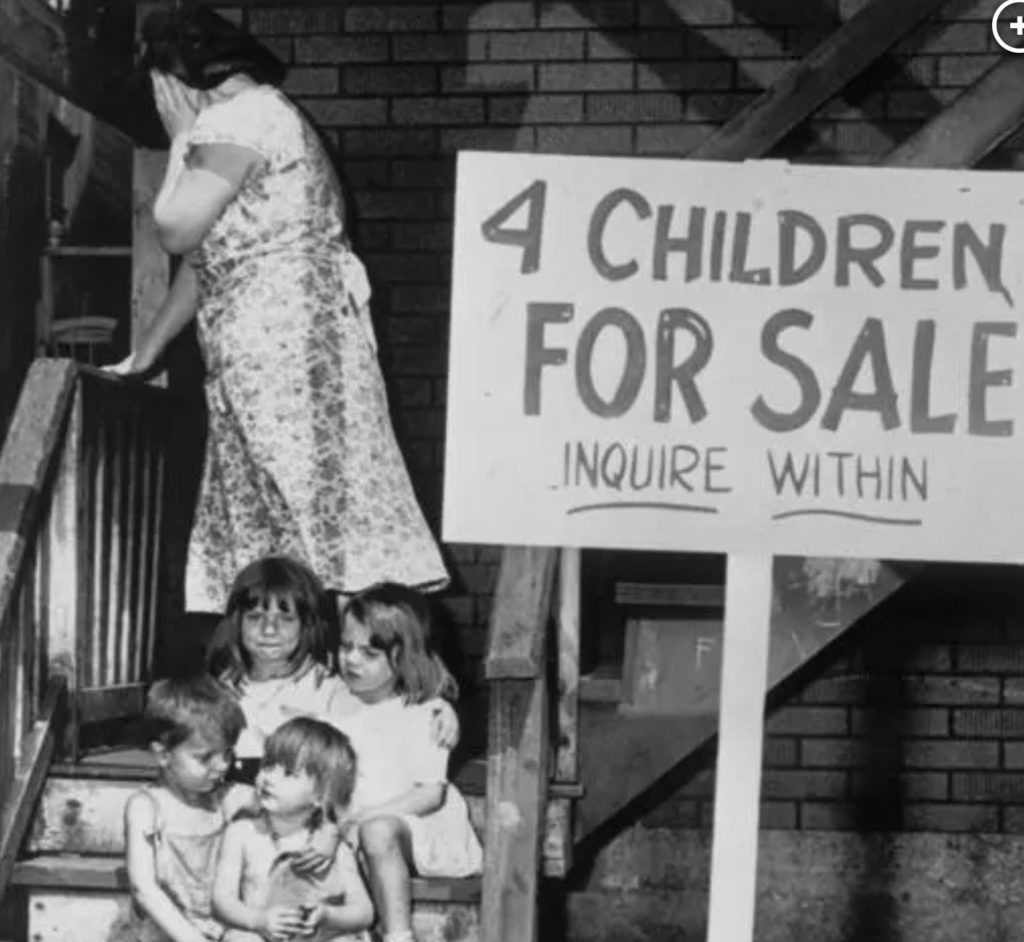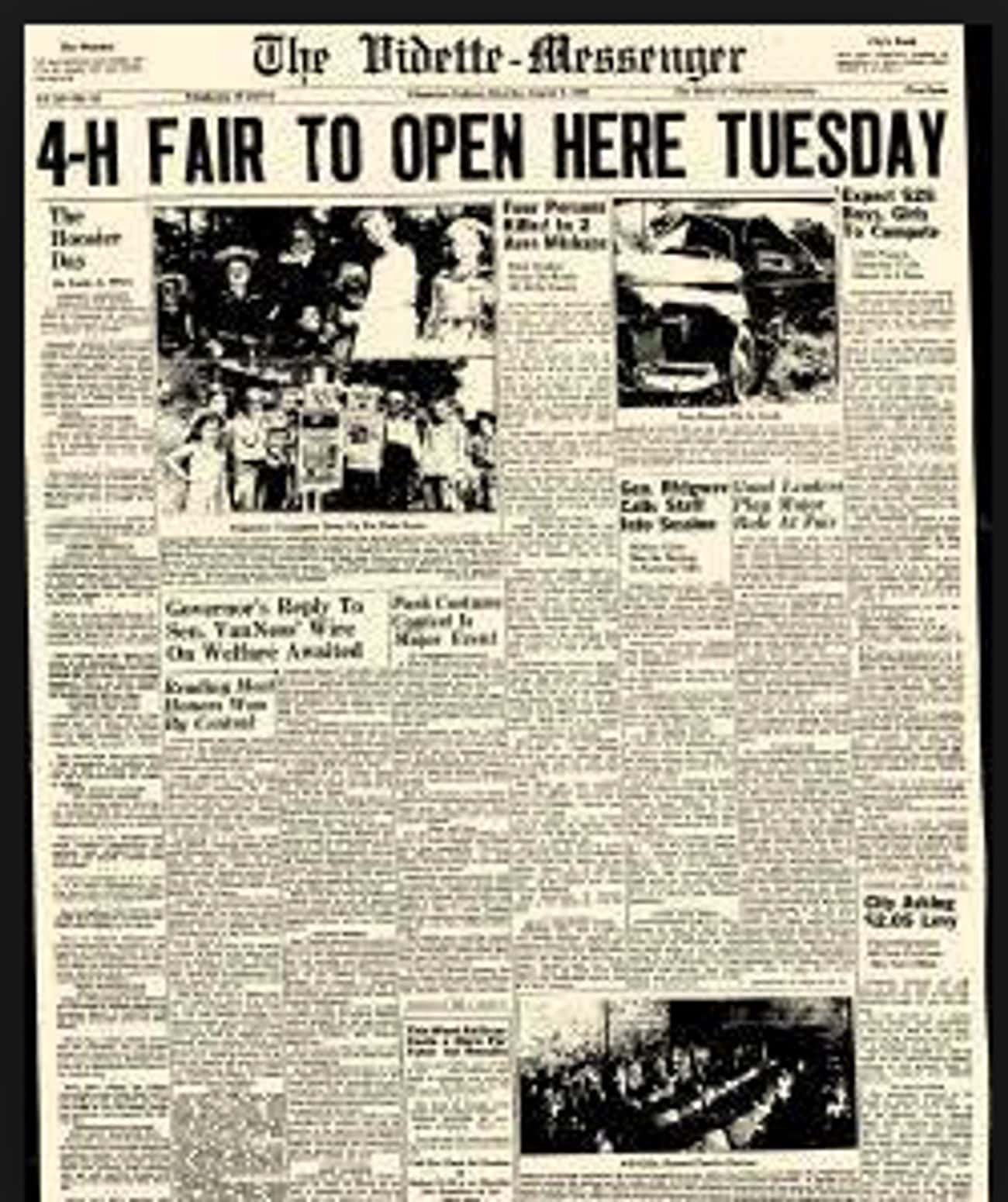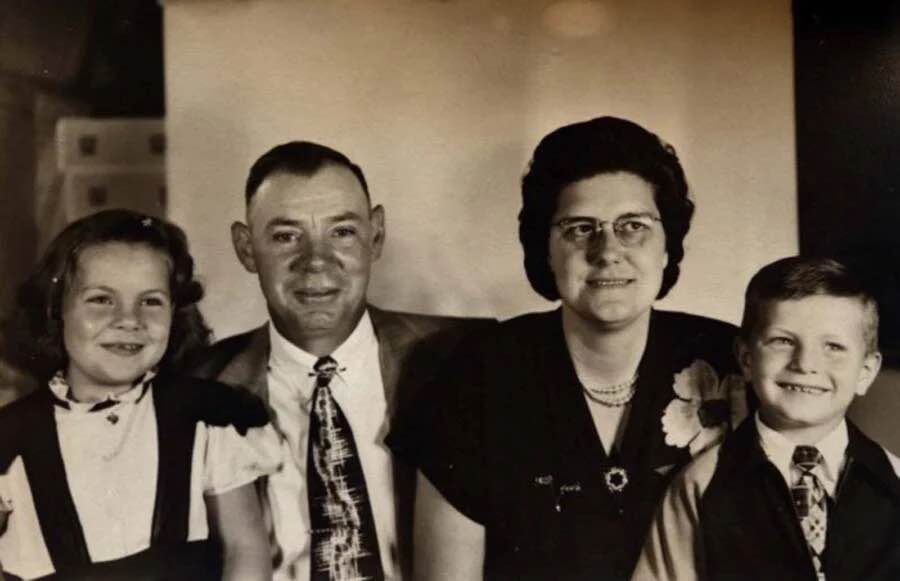In the late 1940s, a heartbreaking image showing four children for sale was published in newspapers across the United States. A woman named Lucille Chalifoux and her husband, Ray faced the challenges of being out of work and on the verge of eviction and seemingly had no other option. However, there may have been more to it than what the public had been led to believe. Eventually, the children would have the opportunity to tell their stories.
Children for Sale
On August 5, 1948, an advert was posted in the Vidette-Messenger in Valparaiso, Indiana, that showed a mother, with her back turned and her head in her hands, seemingly distraught. Meanwhile, her four young children sat on the steps behind her, next to a sign that read: “4 children for sale. Inquire within.” The announcement eventually made its way into newspapers all over the U.S. From New York and Pennsylvania to Ohio, Michigan, and Wisconsin. Then, it made its way into newspapers in Iowa, Texas, and a few other states.

The children for sale were Lana, aged 6, and Rae, aged 5, seen sitting on the upper step. Meanwhile, their four-year-old brother Milton sat on the lower step with two-year-old Sue Ellen. It turns out that Lucille was pregnant with her fifth child, who would also be sent away. Many of the children have little recollection of their birth mother or taking the photo. However, some would meet Lucille later in life, and find that her decision may not have come out of necessity. The children for sale each have their own unique and fascinating, if not tumultuous story that they’ve been able to share with one another. With the exception of Lana, who passed away in 1998 of cancer.
Getting to Know the Children for Sale
Alternatively, they have managed to connect with Lana’s family in the hopes of learning all they can about the life lived by their oldest sister. Although it’s sad that they never did get to reconnect with their older sister, Rae, and Milton had the opportunity to spend time together throughout their lives. Although there is no clear evidence of the children being purchased or adopted, Rae and Milton were sent to go live with John and Ruth Zoeteman in DeMotte, Indiana. According to Rae, Lucille sold her for $2. Apparently so, she could have bingo money because the man she was involved with wanted nothing to do with her children. So, she put the children for sale.

Rae and Milton’s names were changed to Beverly and Kenneth, and they lived together for some years before Rae was sent away to Michigan to a home for unwed mothers after being raped and becoming pregnant. Her daughter was taken from her and adopted out. The home they were raised in was “loveless” and “abusive,” with Rae recalling the only time she ever felt anything from the man who had raised her was on his deathbed. “They used to chain us up all the time,” she said. “When I was a little child, we were field workers.” At 21 years old, she reunited with Lucille briefly, noting that she felt “no love.”
Reconnecting with the Children for Sale
Years later, she would give birth to a son, Lance Gray, who played a key role in helping her connect with her siblings on social media. “They don’t make ’em like her no more,” he said of his mother. “Tough as nails.”
The photo showing the children for sale was sent to her by Milton. “My brother in Tucson somehow sent it to my e-mail,” she said. “I got on there and said, ‘Good God. That’s me.’”
Milton
Meanwhile, Milton would end up in Tuscon after his own difficult journey. “There’s a lot of things in my childhood I can’t remember,” Milton said of being one of the children for sale. His first day with his adoptive parents, he was beaten, tied up, and told he would be a slave. “I said I’d go along with that,” he shared. “I didn’t know what a slave was, I was only a kid.” Milton would continue to be mistreated, being locked in a barn and given only peanut butter and milk. One day, Milton asked why he was being treated this way and was told to “keep him in line.” “If you’re afraid, you’ll listen to me,” John explained to him. He eventually went to live with an aunt and uncle, going to high school and helping with an egg delivery business.
Milton was eventually placed in the care of his friend’s family, noting that his adoptive parents were actually considered foster parents. “I thought I had been adopted,” he said. “I don’t know how they got away with it.” He went through some issues, eventually landing in a mental hospital where he was diagnosed with schizophrenia. He was released in 1967 and moved to Chicago before eventually settling down in Tuscon. “My in-laws gave us $500, and we moved to Arizona,” he said.

Meeting Lucille
Milton, like his sister, also met their birth mother long after she put her children for sale. In 1970, he stayed with her for a month. However, he got into a fight with her husband at the time, and the husband was arrested. As a result, Lucille threw Milton out. “My birth mother, she never did love me,” he said. “She didn’t apologize for selling me. She hated me so much that she didn’t care.”
Sue Ellen
Sue Ellen also had no record of her adoption but believed she had been adopted “legitimately” by a couple whose last name was Johnson. Sadly, she passed away from lung disease in 2013 but not before reuniting with Rae. “It’s fabulous. I love her,” Sue Ellen wrote of her sister. In contrast, “She needs to be in hell burning,” she wrote of her biological mom.
The Youngest to Go
Their youngest brother, David, born Bedford Chalifoux, was not one of the children for sale. Instead, he was taken from his mother and put into the custody of the McDaniels, who were unable to have a child. “I had bed bug bites all over my body,” he said. “I guess it was a pretty bad environment.” His adoption records state that his biological father had left them, and he “does not return to his home because of a criminal record against him in Cook County, Illinois.”
He grew up only a few miles from Rae and Milton and would occasionally visit them. “They’d be tied up in the barn,” McDaniel said. “They were badly abused.” McDaniel also met his birth mother, noting that he had remarried and had four more children. All of whom she kept. “As soon as my mom seen me, she said, ‘You look just like your father,’” McDaniel said. “She never apologized. Back then, it was survival. Who are we to judge?”
“We’re all human beings. We all make mistakes. She could’ve been thinking about the children. Didn’t want them to die.” he concluded.
The image of the children for sale is hauntingly horrific because it was initially believed to be the result of hard times. While that may still be true, it’s evident from the stories of these siblings that their mother had ulterior motives that undoubtedly shake the core of loving mothers everywhere.



